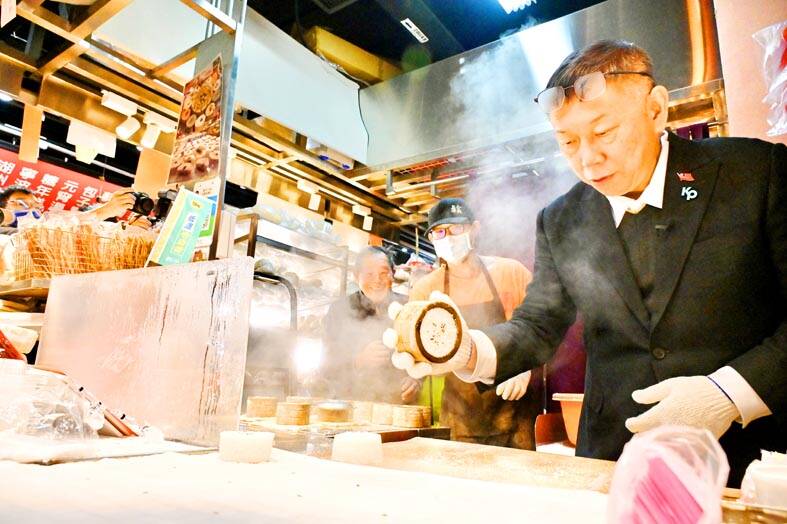The Taiwan People’s Party (TPP) on Wednesday announced proposals to curb the government’s use of special budgets and expand the allocation of tax revenues to local governments.
TPP legislator at-large candidates Huang Kuo-chang (黃國昌) and Chang Chi-kai (張啟楷) made the proposals during a news conference at the campaign headquarters of TPP Chairman and presidential candidate Ko Wen-je (柯文哲) in New Taipei City.
Speaking first, Huang said that Taiwan’s current system gives the central government control of 82 percent of tax revenue, leaving local governments underfunded and unable to raise sufficient revenues on their own.

Photo: George Tsorng, Taipei Times
He claimed that the ruling Democratic Progressive Party (DPP) supported reforming the law governing such matters — the Act Governing the Allocation of Government Revenues and Expenditures (財政收支劃分法) — when it was in opposition, but has made no effort to do so since it came to power in 2016.
To resolve these issues, the TPP is to push for legal amendments to expand the distribution of funds to local governments and ensure that they are allocated at a uniform rate to all cities and counties, Huang said.
Huang’s proposal echoed previous TPP pronouncements on the issue, which have criticized the fact that almost two-thirds of the tax revenue allocated to local governments go to the six special municipalities, with the remaining one-third split between 16 other cities and counties.
Meanwhile, Chang said the TPP would also push to amend the Budget Act (預算法) to ensure the government does not use special budgets outside of the general budget as a “blank authorization” for unrestrained spending.
In response to the criticism, DPP spokesman Chang Chih-hao (張志豪) said that Ko had failed to show fiscal discipline as Taipei mayor.
In addition, Chang accused him of raiding city government funds to repay municipal debt. Under Article 83 of the Budget Act, special budgets can be proposed for wars or emergency national defense installations, major national economic events, major calamities or “major political events that take place irregularly or once every few years.”
Under President Tsai Ing-wen (蔡英文), the government has passed NT$2.4 trillion (US$76.7 million) in special budgets, including funding for the Forward-Looking Infrastructure Development Program that has gone to overbudgeted projects like the Hsinchu Municipal Baseball Stadium, Chang said.

Taiwan is to commence mass production of the Tien Kung (天弓, “Sky Bow”) III, IV and V missiles by the second quarter of this year if the legislature approves the government’s NT$1.25 trillion (US$39.78 billion) special defense budget, an official said yesterday. Commenting on condition of anonymity, a defense official with knowledge of the matter said that the advanced systems are expected to provide crucial capabilities against ballistic and cruise missiles for the proposed “T-Dome,” an advanced, multi-layered air defense network. The Tien Kung III is an air defense missile with a maximum interception altitude of 35km. The Tien Kung IV and V

The disruption of 941 flights in and out of Taiwan due to China’s large-scale military exercises was no accident, but rather the result of a “quasi-blockade” used to simulate creating the air and sea routes needed for an amphibious landing, a military expert said. The disruptions occurred on Tuesday and lasted about 10 hours as China conducted live-fire drills in the Taiwan Strait. The Civil Aviation Administration (CAA) said the exercises affected 857 international flights and 84 domestic flights, affecting more than 100,000 travelers. Su Tzu-yun (蘇紫雲), a research fellow at the government-sponsored Institute for National Defense and Security Research, said the air

Taiwan lacks effective and cost-efficient armaments to intercept rockets, making the planned “T-Dome” interception system necessary, two experts said on Tuesday. The concerns were raised after China’s military fired two waves of rockets during live-fire drills around Taiwan on Tuesday, part of two-day exercises code-named “Justice Mission 2025.” The first wave involved 17 rockets launched at 9am from Pingtan in China’s Fujian Province, according to Lieutenant General Hsieh Jih-sheng (謝日升) of the Office of the Deputy Chief of the General Staff for Intelligence at the Ministry of National Defense. Those rockets landed 70 nautical miles (129.6km) northeast of Keelung without flying over Taiwan,

A strong continental cold air mass is to bring pollutants to Taiwan from tomorrow, the Ministry of Environment said today, as it issued an “orange” air quality alert for most of the country. All of Taiwan except for Hualien and Taitung counties is to be under an “orange” air quality alert tomorrow, indicating air quality that is unhealthy for sensitive groups. In China, areas from Shandong to Shanghai have been enveloped in haze since Saturday, the ministry said in a news release. Yesterday, hourly concentrations of PM2.5 in these areas ranged from 65 to 160 micrograms per cubic meter (mg/m³), and pollutants were